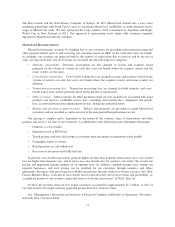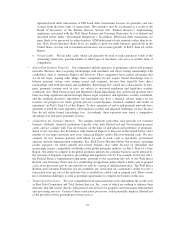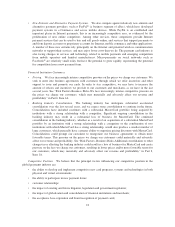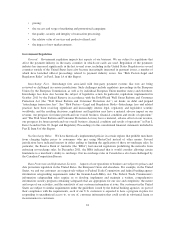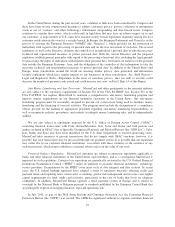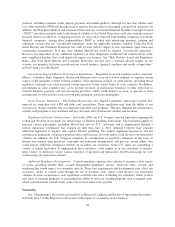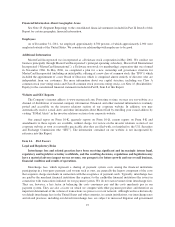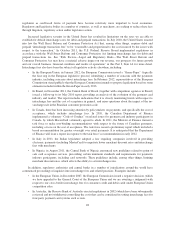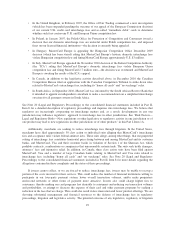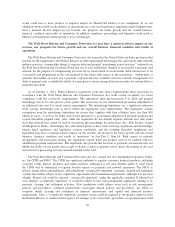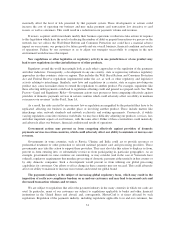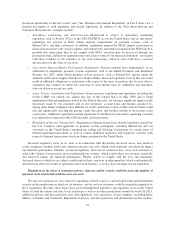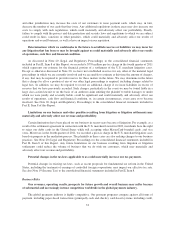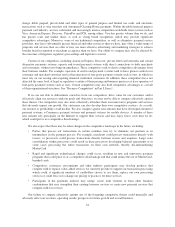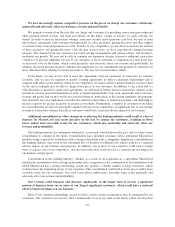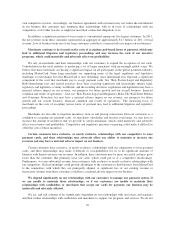MasterCard 2011 Annual Report Download - page 30
Download and view the complete annual report
Please find page 30 of the 2011 MasterCard annual report below. You can navigate through the pages in the report by either clicking on the pages listed below, or by using the keyword search tool below to find specific information within the annual report.products, including consumer credit, deposit, payment, and similar products, although it is not clear whether and/
or to what extent the CFPB will be authorized to regulate broader aspects of payment card network operations. In
addition, the Wall Street Reform and Consumer Protection Act created the Financial Stability Oversight Council
(“FSOC”) in order to identify risks to the financial stability of the United States that could arise from the material
financial distress or failure of, or ongoing activities by, large, interconnected bank holding companies or nonbank
financial companies. Among other responsibilities, FSOC is tasked with identifying payment, clearing and
settlement systems that are “systemically important” under the applicable statutory standard. Under the Wall
Street Reform and Consumer Protection Act, such systems will be subject to new regulation, supervision and
examination requirements. It is not clear whether MasterCard would be deemed “systemically important.”
However, the imposition of any additional regulatory or other obligations on MasterCard could result in costly
new compliance burdens that could negatively impact our business. See “Risk Factors—Legal and Regulatory
Risks—The Wall Street Reform and Consumer Protection Act may have a material adverse impact on our
revenue, our prospects for future growth and our overall business, financial condition and results of operations”
in Part I, Item 1A of this Report.
Government-Imposed Market Participation Regulations. Regulators in several countries such as Australia,
Mexico, Colombia, India, Singapore, Russia and Indonesia have received statutory authority to regulate certain
aspects of the payments systems in these countries. Such regulations include, or could include, providing broad
regulatory oversight over retail payment system operators to the central banks in such countries. In addition,
governments in some countries may act to provide resources or preferential treatment or other protection to
selected domestic payment card and processing providers, which could displace us from, or prevent us from
entering into, or substantially restrict us from participating in, particular geographies.
Issuer Practice Regulation. The Federal Reserve has also adopted regulations addressing overdraft fees
imposed in connection with ATM and debit card transactions. These regulations may limit the ability of our
customers to charge overdraft fees in connection with debit card programs. This may diminish the attractiveness
of debit card programs to our customers and may adversely affect transaction volumes and revenues.
Regulation of Internet Transactions. In October 2006, the U.S. Congress enacted legislation requiring the
coding and blocking of payments for certain types of Internet gambling transactions. The legislation applies to
payment system participants, including MasterCard and our U.S. customers, and is implemented through a
federal regulation. Compliance was required no later than June 1, 2010, although Congress may consider
additional legislation to legalize and regulate Internet gambling. The federal regulation required us and our
customers to implement compliance programs that could increase our costs and/or could decrease our transaction
volumes. In addition, the U.S. Congress continues its consideration of regulatory initiatives in the areas of
Internet prescription drug purchases, copyright and trademark infringement, and privacy, among others, that
could impose additional compliance burdens on us and/or our customers. Some U.S. states are considering a
variety of similar legislation. If implemented, these initiatives could require us or our customers to monitor,
filter, restrict, or otherwise oversee various categories of payment card transactions, thereby increasing our costs
or decreasing our transaction volumes.
Additional Regulatory Developments. Various regulatory agencies also continue to examine a wide variety
of issues, including identity theft, account management guidelines, privacy, disclosure rules, security and
marketing that would impact our customers directly. These new requirements and developments may affect our
customers’ ability to extend credit through the use of payment cards, which could decrease our transaction
volumes. In some circumstances, new regulations could have the effect of limiting our customers’ ability to offer
new types of payment programs or restricting their ability to offer our existing programs such as prepaid cards,
which could materially and adversely reduce our revenue and revenue growth.
Seasonality
See “Management’s Discussion and Analysis of Financial Condition and Results of Operations-Seasonality”
in Part II, Item 7 of this Report for a discussion of the impact of seasonality on our business.
26



